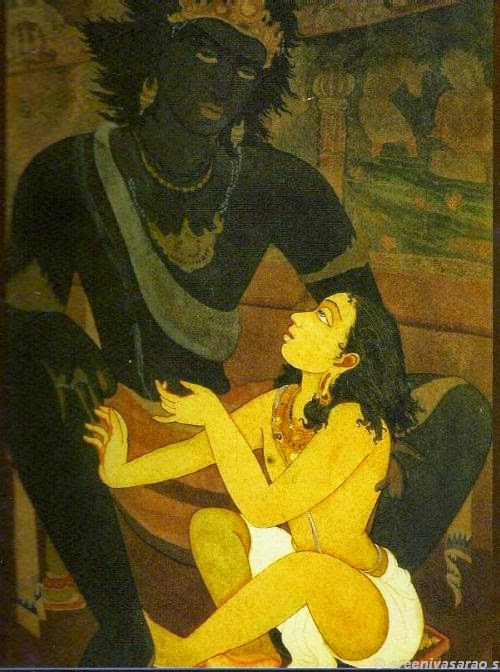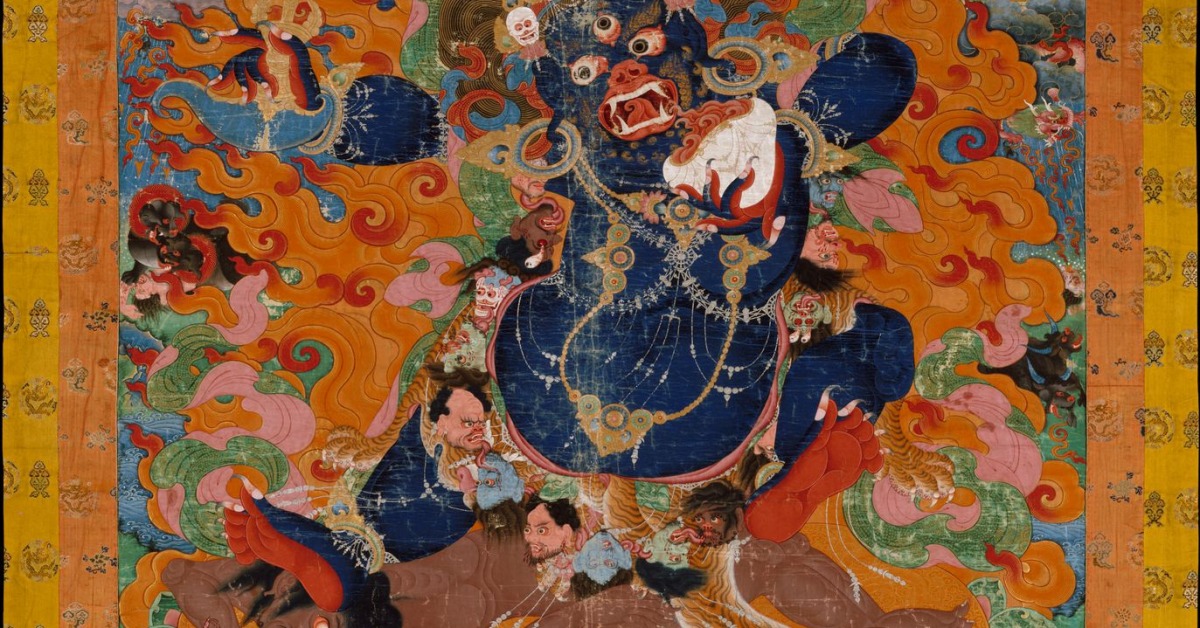Introduction
Nachiketa is the main protagonist of this story. This story is from Katha Upanishad. The meaning of the name Nachiketa is the one who does not let his energy be lost in an endless loop.
This story tells the secret to immortality. It is the story of a boy who dared to ask death itself, the way to gain immortality. Seeing the boy’s persistence, Yama, the Lord of Death, gives him the answer. And so, the secret is unveiled, read the story below to find out.
Story
Once there was a young boy called Nachiketa. He was a bright young boy with an inquisitive mind. He was obedient to his parents and the religious rituals, but not without questioning them. He was one of those people, who wanted to get to the root cause of each and every action. He was one who always longed for the truth.
One day his father, Vajashravas, performed a certain Yagya (a ritual to create balance in nature). Many pandits were called and they performed various Vedic rituals like offering ghee, milk, and rice to the sacred fire. The fire burned brighter and powerfully as they chanted ancient Vedic hymns as old as the time itself.
After the Yagya, Nachiketa saw his father offer gifts to the pandits like clothes, fruits, and cows from their farm.
But the observant Nachiketa saw that the cows his father was offering were weak and old. Nachiketa in order to help his father please the saints, came forward to offer himself as a gift.
He asked his father, “Father, to whom will you give me?”
He realized what Nachiketa meant, but decided to ignore him. Yet Nachiketa kept on insisting.
“Father, to whom will you give me?”
Ashamed of his own lack of generosity and angry with his son for pointing this out, Vajashravas said in anger, “To Yama, the Lord of Death, I will give you.”
Nachiketa knew that his father didn’t mean this.
But Nachiketa was an obedient and inquisitive son. He accepted his father’s wish and decided to head south, to meet the King of Death.
“No Nachiketa, I didn’t mean it. Come back, son,” his father said.
Yama said that this is forbidden knowledge. Not even the gods are privy to this secret.
But Nachiketa had decided that sooner or later everyone has to die. He would also have to die eventually, why wait in line. Why not meet the King of Death on his own wish and ask him about the secret of death? A mystery and a malady that haunted each and every living soul. The rich and the poor, the saints and sinners, nobody could escape it.
Nachiketa reached Yama’s house and waited for him for three days. Yama’s house was surrounded by an iron fence and he was not at home. Nachiketa had to sit and wait at his doorsteps.
With firm resolve, Nachiketa waited three days and nights without food and water.
In Indian tradition, it is considered a grave sin if a guest is made to wait.
Finally, Nachiketa saw Yama arriving on a water buffalo, with a crown on his head and jewels around his neck. He looked like the King of his universe. His eyes glittered and his long mustache bent upwards with pride.
Yama looked fierce even to the brave Nachiketa. But seeing that a guest had come to his abode, Yama greeted Nachiketa warmly.
“What is such a fine young man doing at my adobe?” asked Yama.
Nachiketa told Yama about his predicament with his father. Yama patiently listened and realizing that he had made a mistake by making a guest wait for so long, he proceeded to give Nachiketa permission to ask him for three boons
Nachikta asked for his first boon, that his father no longer remain angry with him when he returned home. Yama granted this wish.
Next, Nachiketa asked that the sacred fire ritual that is used to ascend to heaven be elaborated to him.
Yama agreed and told Nachiketa the right dimensions of the bricks to be laid and the number of bricks to be laid at the fire altar for the ritual.
Then Nachiketa asked the third boon. Hearing the third wish, Yama was left baffled. He pleaded with Nachiketa to ask something else.
But Nachiket didn’t budge. He wanted to learn the mystery of what comes after the death of the body.
Yama said that this is forbidden knowledge. Not even the gods are privy to this secret. He offered Nachiketa alternatives to this boon. He gave him the option to ask for wealth, kingdom, sensual pleasures, anything materialistic he wanted he would be granted.
But Nachiketa was a boy of deep spiritual curiosity. He was never attracted to transient pleasures which were found in materialistic things or wordly desires. He knew that eventually, even the greatest of Kings died, and the mightiest of the Kingdoms fell. There was no point in asking for things that ultimately died. He wanted to grasp the eternal, something that even death couldn’t touch. Was there such a thing that even death could not take away?

Yes, there was and Yama, The Lord of Death, the mightiest and the most feared by all, bowed down to the determination of this young boy and proceeded to reveal to him the secret to immortality.
Yama said: “There are two paths in life – the path of pleasure and the path of spirituality. The first is ignorance and the second is wisdom. Both these paths end differently.
“The person seeking pleasure is left with nothing in the end. But, the one who seeks spirituality obtains Brahman, that is the totality. The ultimate source of joy.
“Through a calm and still mind, a person realizes the self, which resides in the heart of every creature of this planet. This is the Brahman, the eternal. It never dies. It can never perish. It is your true self. One who realizes this true self is free from the bondage of life and death and the cycle of rebirth. If you know this self Nachiketa, you are free from death.”
Yama then goes to explain the important thing about the Nature of Brahman according to Hindu metaphysics.
“The sound of Om! Is the syllable of the supreme Brahman. The atman (soul) is synonymous with the Brahman. The goal of the wise is to know the Bhraman. This is possible through meditation and spiritual practices so the mind can be stilled. One must discriminate between the Atma from the body, which is the seat of desire. Understanding the Self, leads to Moksha.
“Yes, this is immortal. Yes, this is pure. Yes, this is immortal. Know the Brahman Nachiketa and you shall be free.”
And so, the young and brave Nachiketa received from Yama the teaching of immortality and the way to achieve it through meditation and discrimination on the difference between true self and the illusionary world of Maya.
Returning to his father, he had obtained Brahman. And so may anyone who truly knows the self.
May Brahman protect us all,
May he enjoy us all,
May we gain strength together,
May our Self-Knowledge brightly shine,
May we cease from disputation,
AUM! Peace! Peace!
Hari Hi, AUM!”
Katha Upanishad, part 6, verse 19, translated by Alan Jacobs
References
- Book: The Principle Upanishads by Sarvepalli Radhakrishnan
- Book: The Principal Upanishads by Alan Jacobs
